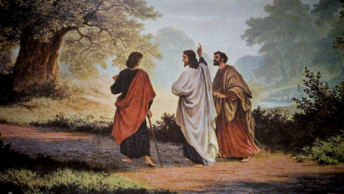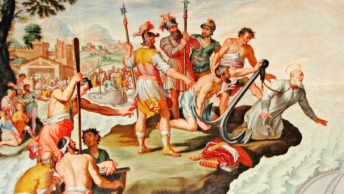The readings for the 19th Sunday in Ordinary Time (Wisdom 18:6-9; Hebrews 11:1-2, 8-19; Luke 12:32-48) are all about genuine, factual faith; they are about tested faith, faith in action, faith for the long haul.
Because of their faith in God’s promise of deliverance the Hebrews in Egypt were able to endure the hardships of slavery and also very trying times in the desert until they were freed by God and led to the Promised Land. By faith, Abraham and Sarah were sustained against all hopes and impossible odds; and believed that God’s promises made to them will have been fulfilled—and they were. Faith was the common denominator of all those who placed their present and their entire future in God’s hands.
Nowadays it is still faith that makes the difference in the life of believers, and separates God’s servants into two categories: those who truly believe from those who rely on faith-substitutes.
Before proceeding I should give again my definition of faith and my definition of religion. Faith is the realization that God, the God of Abraham, Isaac and Jacob, has entered into our life and has asked us to move out of our familiar surroundings and comfort zone; and to journey to an unknown land following his directives and trusting in his presence and power.
Religion is remarkably different. Religion is our doing; it is our effort to come up with a convenient god whose power we can harness to our advantage and call upon to do for us what is too hard or impossible for us to do ourselves. Through prayers, sacrifices and entreaties this god is invoked and asked to execute according to our bidding. If this god of our choosing does not deliver as we requested, we would try a different approach and, then, still another until we would get what we want or we might try to find another, more powerful, more convenient god.
At this point we should try to determine if we are truly people like Abraham and Sarah or people of religion. My suspicion is that we find ourselves somewhere between weak faith and full-blown religiosity.
We can begin, at the very core of our being, to find this out by trying to answer a simple question: “Do I always feel blessed as one belonging to the people the Lord has chosen to be his own? This is, after all, the refrain we repeated several times today.
Unquestionably, at times we feel blessed and are grateful to the Lord. However we do not feel blessed all the time. There are even periods during which we feel particularly frustrated because we do not get from God what we have prayed for, insisted on, fought and struggled to attain. Generally speaking we might be almost ready to admit that a decent realization of our hopes, dreams and pet peeves would mean more to us than God’s blessings.
However, for most of us this is something that we are ashamed to admit, because we sense that it is not becoming of a Christian calling. So, in order to cut through possible delusions and pious pipedreams, we can determine for ourselves if we are basically people of genuine faith or simply religious, pious folks.
But I must warn you that the test that I am about to propose as a foolproof way of assigning ourselves to one group or the other, exposes our conduct and especially our reactions to the scrutiny of others in an overt fashion.
People of faith lead a basically serene life, no matter what. Their inner disposition of full trust in the love of the Father is so solid and unshakeable that they are very seldom disappointed; they are rather habitually tranquil and confident, and never frustrated, never restless and never bent on having it their way. They live out the belief that nothing happens by chance; but all happens according to God’s design, both the good and the bad of life.
People of religiosity, on the opposite side, are frantically bent on trying everything to attain what they deem important and proper. Very seldom do they smile unless they get the break that they had wanted for the longest time. They are fundamentally restless and they increase their restlessness precisely by persisting in having it their way. It hasn’t dawned on them, yet, that happiness can be attained only in finding out God’s will at every turn and carrying it out with unwavering trust in his love, genuine enthusiasm, resolute courage and generous self-giving. Their prayers are used mostly as “spiritual currency” to wrest from God’s hands what they deem pressing and much needed for their plan to be realized. They cannot bring themselves to simply saying to God: “Thy will be done in all aspects of my life.”
Remember, we can fool ourselves, we can even try to pretend to be this or that but, in the long run, people with whom we rub elbows cannot be fooled; they will know soon enough if we are people of faith or people of religion. Actually, so many know it already even though they won’t tell us.
My friends, the trials of life could be such that they might be almost too much even for a person of faith to bear. For this reason let me remind myself and all of you that faith is nurtured by silent and habitual contemplation of God’s mighty deeds in the Bible, and also of those smaller wonders performed by him in our uneventful life, if only we can stop and look at our life with honesty and pure eyes. This is the way to genuine faith, the way to freedom from fear, frustration and restlessness; because it is the way that will make us realize that the Father is pleased to give us the Kingdom. This is the way confirming that we are the blessed servants the Lord has chosen to be his own.








